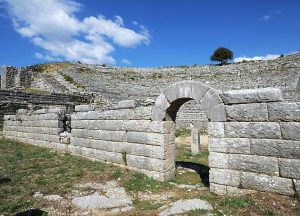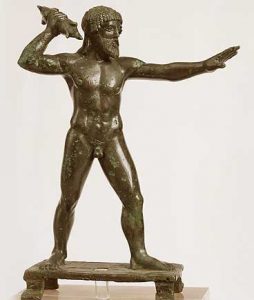Dodona, the oldest Greek oracle in antiquity
 The oldest oracle in Greece was that of Dodona in Epirus, it was built at the suggestion of a black dove and the faithful received oracles from the rustling of oak leaves. According to the legend mentioned by Herodotus, two black doves started from Thebes, Egypt. One went to Libya where the sanctuary of Ammon Zeus was built and the second landed on an oak tree in ancient Dodona and suggested to the people the establishment of a sanctuary in honor of the ruler of the Olympian gods, Zeus. Until then, the oracle of Dodona was open and dedicated to the goddess Earth.
The oldest oracle in Greece was that of Dodona in Epirus, it was built at the suggestion of a black dove and the faithful received oracles from the rustling of oak leaves. According to the legend mentioned by Herodotus, two black doves started from Thebes, Egypt. One went to Libya where the sanctuary of Ammon Zeus was built and the second landed on an oak tree in ancient Dodona and suggested to the people the establishment of a sanctuary in honor of the ruler of the Olympian gods, Zeus. Until then, the oracle of Dodona was open and dedicated to the goddess Earth.
The priests built a sanctuary in his honor at the foot of the hill and pilgrims gathered in the oracle to receive oracles for the future. The oracles were given by the sacred tree of Zeus, the oak tree, which was in the center of the sanctuary. According to a legend, Zeus lived at the roots of the tree. The believers wrote their question on plates and the priests interpreted the messages sent to them by the god from the rustling of the leaves, from the purring of the birds and from the copper boilers that existed around the sanctuary and gave the oracle. According to mythology, the goddess Athena took a piece of wood from the sacred plant of Dodona and nailed it to the prow of Jason’s ship Argo.
In the early years in the oracle there were only male priests, who slept on the earth to listen to the messages sent to them by the gods and to give answers to the questions of the faithful. In the following years, women priests, the “Peliades”, also participated.
When Pausanias saw the sanctuary of Zeus in Dodona, he described it as a “goddess of value”. In Dodona, the wife of Zeus was not Hera but Dioni, who in Greek mythology belonged to the first generation of gods and represented knowledge and fertility.
 The approximately 256 objects from the ruins of the oracle of Dodona were transferred from the Museum of Ioannina and the National Archaeological Museum to the Acropolis Museum.
The approximately 256 objects from the ruins of the oracle of Dodona were transferred from the Museum of Ioannina and the National Archaeological Museum to the Acropolis Museum.
Among them were votives offered to Jupiter, bronze objects and lead plates engraved with questions about trade, property, health, debts, marriage and childbearing.
The exhibits were placed under an oak tree with artificial leaves that had one of the pillars of the Museum as its trunk.
The exhibition described Dodona in the Late Bronze Age and the primitive worship of the goddess Earth and then focused on the worship of Zeus. The purpose was to teach the thousands of foreign and Greek visitors the role and importance of the oldest Greek oracle in antiquity
What does Dodona mean?
Some believe that its etymology comes from Zeus; others from the nymph Dodona. Others finally from the verb dodo, which means to boom (thunder as a personification of Zeus) or from the verb didomi, for the rich and fertile plain that produced many fruits.
The foundation of the oracle is, as with all ancient oracles, lost in myth. Two pigeons started from Thebes in Egypt and settled one in the temple of Ammon in the oasis of Shiva and the other in Dodona. This dove spoke with a human voice and decreed that a sanctuary of Zeus be established in Dodona, around the sacred oak of the king of the gods. When a woodcutter tried to cut it down, the pigeon stood on its branches and spoke to him, dissuading him.
When Jason was building the Argo to start the Argonautic Campaign, the sanctuary of Dodona was already thriving. The goddess Athena placed a piece of wood from the sacred oak on the bow: the wood spoke and had divination abilities. One of Jason’s 50 companions on the journey to Colchis was the seer Mopsos, who came from Dodona. A mythological generation later, Homer in the Iliad has Achilles pray to the Zeus of Dodona for Patroclus to return safe from battle, while in the Odyssey Odysseus resorts to the oracle of Dodona to inquire about his return to Ithaca: she is the first recorded question in a Greek oracle.
In the early phase of the oracle, the priests of Zeus were men and were called Selloi. They never washed their feet and always lay on the ground. The Sells were the only ones competent to interpret the oracles of Zeus, deciphering the movements and sounds of the sacred oak. Later, as Herodotus testifies, there were three women as priestesses in the sanctuary.
These myths – like all important, timeless myths – hide deeper meanings and reveal, like the typical functioning of the oracle, important elements about the ancient civilization. The word omen in ancient Greece had a double meaning (a carnivorous vulture and a divine sign), as primarily divination was done by studying birds (oenoscopy). The dove is a timeless symbol of purity, while its ability to speak to explain situations is not a prerogative of the ancient world: it is enough to remember “the song of the dead brother”, where Areti, returning with the dead Constantius to her father’s house, listens for the birds to admire “how the living walk with the dead”. The ability of some people to understand the speech of birds did not cease to be considered divine after antiquity: St. Francis of Assisi, the Catholic “saint of the poor” spoke to animals and birds.
The story of the two doves shows the close relationship that the two oracles had throughout antiquity as well as the belief of the Greeks that (Ammon) Zeus was worshiped in the Shiva oasis. The worship of the sacred oak is also not a unique phenomenon in ancient Greece: tree worship is also found among the Minoans. The worship of the oak, however, is more closely related to similar cults in Italy and especially in Prussia, where the sky god was also worshiped in a sacred oak and the priests were analogous to the Sells. The connection of Dodona with the Argonautic Campaign testifies to the close ties that Thessaly and Epirus had before historical times; since then Thessaly turned to Delphi.
But why did the strange priests not wash their feet and lie only on the ground and never on a bed? This ritual highlights a primitive taboo, predating the worship of Zeus. Before the twelve gods, Gaia was worshiped in Dodona and priests had to maintain a connection with her to maintain the gift of prophecy, hence the prohibition against washing feet and lying on bare soil. The archaeological research showed that a sanctuary functioned in Dodona as early as 2600 BC. During the Mycenaean era, the worship of Zeus was established, which was initially done outdoors; there was no temple, but the faithful gathered around the sacred oak tree.
During the Archaic era, the oracle began to lose ground, as the new star of Delphi began to rise. However, he kept the Greek cities that were nearby
